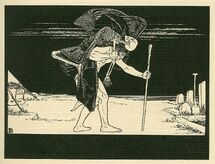
Depiction of a dybbuk by Ephraim Moses Lilien (1874-1925).
In Jewish folklore, a dybbuk is a spirit, believed to be the ghost of a dead person, often evil or wicked, which can possess a living person. The name is an abbreviation of the Hebrew dibbuk me-ru'ah ra'ah (clinging evil spirit) or dibbuk min ha-hizonim (evil spirit from outside). A dybbuk is said to leave the living person's body after it has finished the work which it set out to do. It may also be forced to leave by a rabbi.
Although earlier Jewish writers wrote about demonic possession, saying that those who fell victim to it were usually Jews who questioned their religion or who did not follow rituals correctly, no accounts of possession by ghostly dybbuks exist before the 16th century.

Hana Rovina as Leah'le in a 1920 production of The Dybbuk.
The 1914 Yiddish play The Dybbuk; or Between Two Worlds (Der Dibuk oder Tsvishin Tsvey Veltn) by the Russian playwright Shlyome Zanvl Rappaport, known as S. Ansky, introduced the idea to a wider audience. The play tells the story of a scholar named Hannan who falls in love with a young woman named Leah'le, feeling that she is predestined to be his bride. Hannan dies when he hears that Leah'le is to marry somebody else. His spirit takes possession of Leah'le before her wedding. The dybbuk fulfills its purpose when it reveals that Leah'le's father had promised Hannan's father that their children would marry, meaning that Leah'le's father broke his word. At the end of the play, the ghost of Hannan appears to Leah'le and she chooses to stay with him, presumably following him in death.
A modern addition to the dybbuk myth is the idea that a dybbuk can be trapped inside a wooden box, known as a dybbuk box, although the dybbuk may be able to escape from the box again and misfortune is likely to befall anybody who owns such a box.
A dybbuk is not to be confused with an ibbur, the spirit of a righteous dead person, which, according to Jewish folklore, can temporarily possess a living person at the living person's request.
